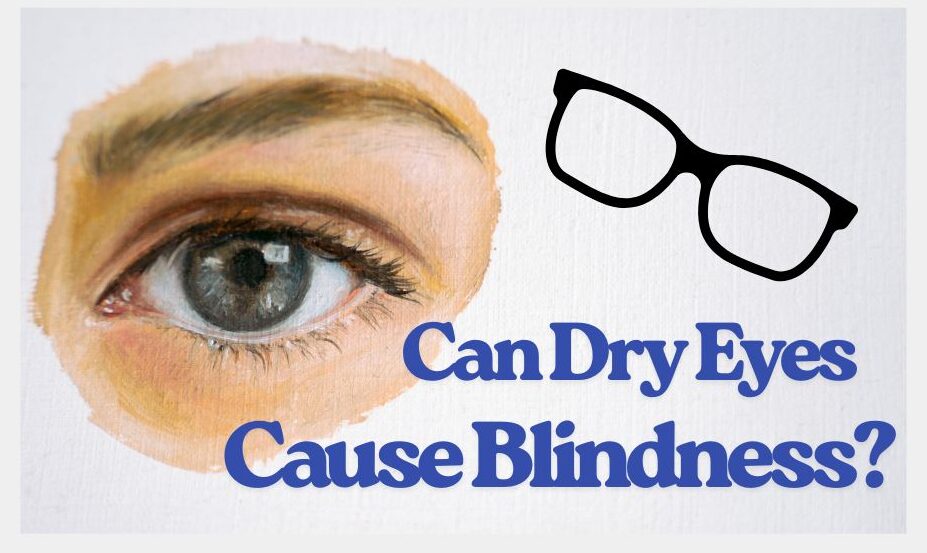Dry eyes are a common issue that millions of people experience daily. From mild irritation to chronic discomfort, dry eyes can make everyday tasks—like reading, working at a computer, or driving—more challenging. But here’s the big question many people ask: can dry eyes cause blindness?
In this article, we’ll explore the connection between dry eyes and vision loss, what causes dry eyes, when it becomes a serious concern, and what you can do to protect your eyesight.
What Are Dry Eyes?
Dry eyes happen when your eyes don’t produce enough tears or when the tears evaporate too quickly. Healthy tears are essential because they lubricate, protect, and nourish the eye’s surface. Without enough tear film, the eyes can feel:
- Itchy or irritated
- Gritty, like sand is inside
- Red or inflamed
- Sensitive to light
Can Dry Eyes Cause Blindness?
The short answer: Severe, untreated dry eye disease can potentially lead to vision loss, but it’s very rare.
- Mild to moderate dry eyes typically cause discomfort, not blindness.
- However, in chronic or severe cases, dry eyes can damage the cornea (the clear outer layer of the eye).
- Corneal damage may include ulcers, scarring, or infections, which can impair vision.
👉 According to the American Academy of Ophthalmology, untreated severe dry eye can result in long-term complications, including vision impairment.
How Dry Eyes Can Harm Vision
Here’s how untreated dry eyes could progress toward more serious complications:
- Corneal Damage – Without adequate lubrication, the cornea becomes vulnerable to scratches and scarring.
- Infections – Tears protect against bacteria. Insufficient tears increase the risk of infection.
- Inflammation – Chronic inflammation of the eye surface can blur vision.
- Ulcers – In severe cases, corneal ulcers may form, threatening sight.
Common Causes of Dry Eyes
Understanding what causes dry eyes can help prevent worsening symptoms:
- Aging – Tear production decreases as we get older.
- Screen time – Staring at phones or computers reduces blinking, which dries out the eyes.
- Medications – Some antihistamines, antidepressants, or blood pressure drugs can reduce tear production.
- Environmental factors – Wind, dry climates, or air conditioning can trigger symptoms.
- Medical conditions – Autoimmune diseases (like Sjögren’s syndrome) or diabetes increase risk.
When to Worry About Dry Eyes
Most dry eye cases are not dangerous. But see a doctor if you experience:
- Persistent redness or pain
- Blurred vision that doesn’t clear up with blinking
- Excessive tearing followed by dryness
- Feeling like something is stuck in your eye
- Sudden sensitivity to light
Treatment Options for Dry Eyes
The good news: dry eyes can be managed. Here are some strategies:
- Artificial tears (over-the-counter eye drops).
- Prescription drops to reduce inflammation (e.g., cyclosporine).
- Lifestyle changes: reduce screen time, use a humidifier, wear wraparound glasses outdoors.
- Omega-3 supplements may help tear quality.
- Punctal plugs: tiny devices inserted by doctors to block tear drainage.
Preventing Long-Term Damage
While dry eyes rarely cause blindness, the key is early treatment:
- Don’t ignore chronic dryness.
- Get regular eye exams.
- Follow your doctor’s treatment plan.
- Protect your eyes from harsh environments.
FAQs About Dry Eyes and Blindness
1. Can dry eyes make vision blurry?
Yes. Dry eyes can cause temporary blurred vision, especially when blinking less often.
2. Can dry eyes be cured?
Most cases are managed rather than cured. Proper treatment can greatly improve comfort and prevent damage.
3. What happens if dry eyes go untreated?
In rare cases, untreated severe dry eyes can cause corneal ulcers, scarring, and even permanent vision loss.

So, can dry eyes cause blindness? For the vast majority of people, the answer is no. Dry eyes are uncomfortable and disruptive, but with proper care, they don’t lead to blindness. However, severe cases of dry eye may cause corneal ulcers, infections, or scarring. In rare instances, this damage can threaten your vision if left untreated.
The key is not to ignore the symptoms. If your eyes feel persistently dry, gritty, or painful, see an eye specialist. With today’s treatments, you can protect your sight and improve your quality of life.
👉 Want to learn more about eye health? Read our post on Coping with Dry Eye: Practical Tips for Everyday Life







